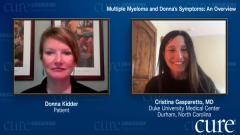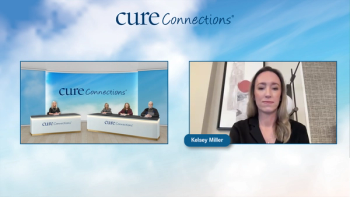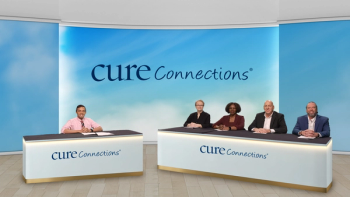
Donna’s Switch to Selinexor and MM Clinical Trial Treatment
Cristina Gasparetto, MD, discusses Donna’s next line of therapy, selinexor, and how being part of a clinical trial impacted her multiple myeloma.
Episodes in this series

Cristina Gasparetto, MD: Now, your myeloma has seen many drugs. You went from Velcade to lenalidomide, then you had chemotherapy, and then carfilzomib, pomalidomide. You got Darzalex for a short period, and the CAR [chimeric antigen receptor]-T cell therapy. So your myeloma is becoming a little more aggressive. I remember that at this point we sat down and we had a long conversation, you and I, and we decided to go to a completely different drug. It’s the drug you’re getting right now, right?
Donna Kidder: Yes.
Cristina Gasparetto, MD: The selinexor. We were lucky that you could have it; selinexor is approved as a single agent with dexamethasone. It also recently was approved in combination with bortezomib in first relapse, based on the results of the BOSTON study showing that if you add selinexor once a week to bortezomib and dexamethasone, patients are responding and also remaining in remission longer, and so the FDA recently approved this combination. When we started to use selinexor twice a week, it was clear that it was difficult to manage the side effects. A lot of gastrointestinal [GI issues], nausea, some diarrhea, weight loss, fatigue, myelosuppression, and we had to support patients aggressively. But now that we’re using the selinexor once a week, tell us your experience. You’re receiving a combination, right?
Donna Kidder: Right. At first, as with any chemotherapy, I had to do the tummy tango, I called it, where you’re trying to figure out what over-the-counter drugs you need to take to alleviate your stomach issues. The nausea, it’s not really bad, I treat it with Zofran, and it’s only for the first day. I have pantoprazole for acid reflux the first day. But my GI issues are pretty much gone two days after I take stuff.
Cristina Gasparetto, MD: What are you receiving right now, selinexor…?
Donna Kidder: Selinexor, dexamethasone and Kyprolis.
Cristina Gasparetto, MD: Kyprolis again is your drug, you’re back, because you always responded to Kyprolis. You were never refractory, meaning your myeloma was always responding to Kyprolis. So we went back to this combination. It’s not approved by the FDA, so you were treated on a clinical trial, and you had a very good response in receiving this drug. Like with all the new drugs, it’s a different spectrum of toxicity. But you are good right now, right?
Donna Kidder: Yes. The numbers are good. I always say, “Thank God it’s Monday,” because by Monday I’m not tired anymore, and I get three days of totally normal.
Cristina Gasparetto, MD: So it’s been a relatively good experience?
Donna Kidder: Yes.
Cristina Gasparetto, MD: And your quality of life, it’s pretty good?
Donna Kidder: Yes. Saturdays aren’t good because that’s when the dexamethasone wears off, and I’m tired and weak. But the rest….
Cristina Gasparetto, MD: What day of the week do you receive treatment?
Donna Kidder: Thursdays.
Cristina Gasparetto, MD: Thursdays. And then by Friday, Saturday you feel down, and then by Monday; but you’re still exercising; you’re still running a little, walking.
Donna Kidder: On Monday, Tuesday and Wednesday.
Cristina Gasparetto, MD: Your quality of life is not perfect, but you’re managing. You’re still independent, except for that day you’re coming in.
Donna Kidder: That’s correct.
Cristina Gasparetto, MD: You are managing the side effects with some of the supportive care, the antiemetic, antinausea medication. Drinking a lot of fluids is key; the first cycle with selinexor is probably the most difficult. So now, you are relatively young, and you and I have talked about what to do next. Are we going to stay on this therapy until it stops working, and then we go to the next therapy? You already received CAR-T cell, so we will need to think about an anti-BCMA [B-cell maturation antigen], a different type of therapy. The belantamab, Blenrep, is another conjugated antibody that was approved by the FDA last year as a single agent. It’s unfortunately given, it’s approved in late relapse, but like all the drugs for myeloma, we’re going to see these drugs moving earlier and earlier. But as a late drug given without anything, even without steroids, it’s the only drug approved—well, actually, there is a very old combination of bortezomib, Doxil, without dexamethasone, that was approved in the early 2000s. So this is the second drug approved by the FDA without steroids.
We’re learning about the toxicity of this drug as well. Unfortunately, it can cause visual, ocular issues, like keratopathy. They are all reversible, but the key is to have your patient seen by an ophthalmologist before each infusion so we can adjust the dose, or hold the dose. But what I like about this drug is that it’s given only every three weeks, for convenience. And then, even if you skip a cycle because you have to wait for the ocular toxicity to improve, you maintain the response. So we haven’t talked about that. We’ve talked about different approaches for choosing a transplant, even doing a transplant using the stem cells of a donor. Lots of my colleagues don’t approach that, or don’t do that, but I do. I still have a lot of patients and good success stories about this type of transplant for a particular subgroup of patients for myeloma. I would not offer it to everybody, but we are presenting some data soon from a clinical trial that we ran nationally with this approach. It’s not really well established in everybody, in every institution, but some patients have good success stories. We can cure leukemia with this approach; maybe we can cure myeloma as well.
You and I will continue to have conversations about where to go and what to do, but you’re still very strong and determined to continue treatment for your myeloma, and right now the treatment is working.
This transcript has been edited for clarity.


